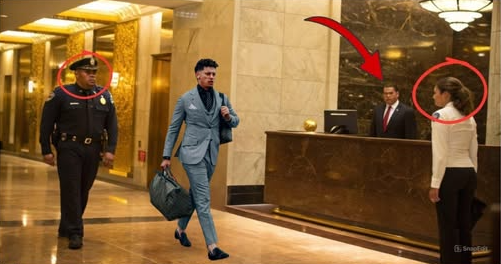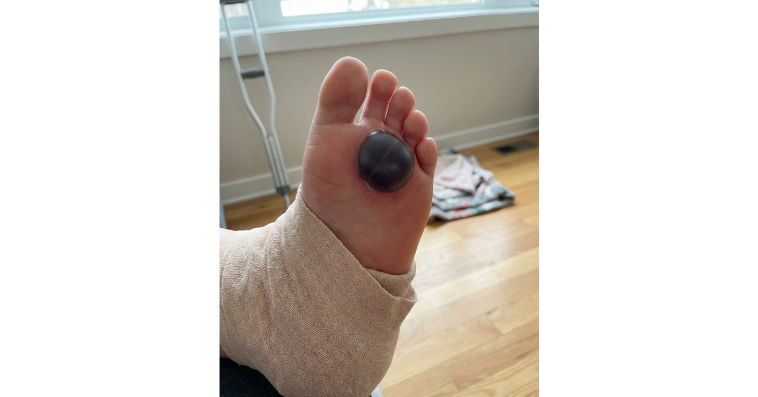On a crisp autumn evening, the Royal Beacon Hotel exuded sophistication, its dazzling chandeliers casting a warm glow on the impeccably polished marble floors. Guests mingled in the opulent lobby, their voices blending harmoniously with the soothing strains of classical piano music. Behind the front desk stood Marissa, a poised and professional young receptionist whose tailored uniform reflected her meticulous attention to detail. Having dedicated three years to the hotel, she took immense pride in upholding its sterling reputation. Her discerning gaze evaluated every guest who entered, guided by an unspoken standard she believed epitomized the ideal clientele.
As the evening unfolded, Marissa greeted a steady stream of elegantly dressed guests with her practiced smile. However, just before midnight, the grand lobby doors parted to reveal a tall Black man stepping inside. His relaxed demeanor was evident in his casual attire—a hoodie and jeans—but the weariness etched on his face suggested a long day. The stark contrast between his informal appearance and the hotel’s refined atmosphere caused Marissa’s professional smile to falter slightly.
“Good evening,” he said politely, approaching the desk with a calm and respectful air. “I’d like to book a room for the night.” He placed his credit card on the counter, his tone courteous and composed.
Marissa hesitated, her eyes drifting to his casual outfit. An unspoken discomfort surfaced, not from direct experience but from internalized, unexamined biases. Although the hotel had several rooms available, Marissa chose a different approach.
“I’m sorry,” she replied with a faint, apologetic tilt of her head. “We’re fully booked for the night.”
The man’s expression shifted almost imperceptibly. Though he didn’t question her claim, the quiet disappointment in his eyes was unmistakable. With a small nod, he retrieved his card and exited silently, the glass doors closing behind him with a soft hiss.
Moments later, an impeccably dressed couple entered the lobby. The man wore a tailored suit, and the woman’s shimmering gown sparkled under the chandelier’s light. Marissa’s demeanor transformed immediately—her smile broadened, her posture straightened, and her tone exuded warmth and enthusiasm.
“Good evening! Welcome to the Royal Beacon Hotel,” she greeted, her voice brimming with energy. In a matter of moments, she handed the couple a room key, conveniently overlooking her earlier assertion that the hotel was at capacity.
Unbeknownst to Marissa, the man she had turned away was Patrick Mahomes, an internationally renowned football star, entrepreneur, and philanthropist. Despite his extraordinary achievements and wealth, Patrick had encountered discrimination before and recognized it for what it was. As he left the hotel that night, he resolved to take action—not out of anger, but with a determination to champion justice and accountability.
The next morning, the Royal Beacon Hotel bustled with its usual activity. Marissa resumed her duties at the front desk, her focus shifting between welcoming guests and answering inquiries. The events of the previous evening had already faded from her memory when the lobby doors swung open once again. This time, a man entered, his tailored suit and commanding presence drawing every gaze in the room.
Marissa’s heart skipped a beat as she recognized him. It was the same man from the previous night, yet his appearance and demeanor now exuded quiet authority. Approaching the desk, he fixed her with a steady gaze.
“Good morning,” he said, his tone calm yet assertive. “I am Patrick Mahomes, the new owner of the Royal Beacon Hotel.”
Marissa felt the blood drain from her face. “Pardon me?” she stammered, her grip tightening on the edge of the desk.
Patrick continued, his voice measured but firm. “Last night, I requested a room, and you informed me that the hotel was fully booked. Shortly afterward, I witnessed you assigning a room to another guest. I’d like to understand why that happened.”
The air in the lobby grew heavy, as if time itself had paused. Marissa opened her mouth to respond but faltered, realizing that no explanation could justify her actions.
Patrick’s gaze remained unwavering, his composure more powerful than any reprimand. “This hotel is more than a luxurious building. It represents an opportunity to welcome and honor individuals from all walks of life. What transpired last night was unacceptable and does not reflect the values I uphold as its owner.”
Marissa swallowed hard, her mind racing for a way to salvage the situation. “Mr. Mahomes, I…I didn’t mean to—”
He raised a hand to stop her. “This isn’t about intentions. It’s about actions. Every person who steps through these doors deserves respect and equitable treatment, regardless of their appearance or attire. As the new owner, I am committed to ensuring this principle is upheld.”
Marissa nodded, her earlier confidence replaced by a profound sense of humility. Patrick’s words were more than a critique; they were a call to accountability and change.
In the weeks that followed, Patrick implemented sweeping reforms at the Royal Beacon Hotel. Staff underwent extensive training in inclusivity and unconscious bias, led by experts who emphasized the importance of treating every guest with dignity. Patrick himself was a regular presence, not as a distant owner but as a hands-on leader embodying the values he sought to instill.
News of the incident spread, drawing both criticism and praise. While some questioned Marissa’s actions, Patrick chose not to dismiss her. Instead, he gave her an opportunity to learn and grow. “Mistakes can teach us valuable lessons,” he said during a private conversation. “What matters is how we move forward.”
Under Patrick’s leadership, the Royal Beacon Hotel became a symbol of progress and inclusivity. Guests from all backgrounds felt genuinely welcomed, and the hotel’s reputation flourished. Marissa, too, transformed. She approached her role with newfound humility, striving every day to embody the principles Patrick had championed.






